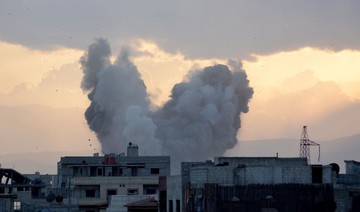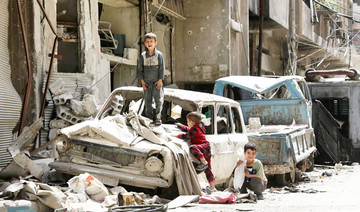BEIRUT: More than a dozen Syrian regime forces have been killed fighting Daesh in a devastated southern district of the capital Damascus, a monitoring group said on Monday.
Forces loyal to Syrian President Bashar Assad ramped up their ground operations and bombing raids against the Palestinian refugee camp of Yarmouk in southern Damascus last Thursday.
Since then, 15 pro-Assad fighters have been killed as well as 19 Daesh terrorists, according to the Syrian Observatory for Human Rights.
The Britain-based war monitor said the assault has also left 12 civilians dead, including women and children.
"Regime forces are continuing to bomb the southern parts of the capital with rockets, artillery, air strikes and helicopters," the Observatory said.
Yarmouk was once a densely populated and thriving district of the capital, but it has been ravaged by violence since Syria's conflict broke out in 2011.
Syria's regime imposed a crippling siege on it in 2012, and fighting has also broken out among radical operatives. In 2015, Daesh overran most of Yarmuk, and other fighters and terrorists, including from Al-Qaeda's former affiliate, agreed to withdraw just a few weeks ago.
Simultaneously, the Syrian regime was recapturing the last opposition pockets in Eastern Ghouta, a suburb of Damascus that had been the opposition's main bastion near the capital.
Troops last week shifted their attention to Yarmouk, but humanitarian organizations have sounded the alarm. The UN's Palestinian refugee agency said the bombardment has put the last operating hospital in Yarmouk out of service and displaced most of the camp's 6,000 remaining civilians.
Syria’s chief opposition negotiator Nasr Hariri said the US cannot afford to leave Syria as it has yet to achieve any of its goals in the region, even though President Donald Trump said recently Washington would withdraw its troops.
“I personally think the US is not capable of withdrawing its fighters from Syria,” Hariri told Reuters.
Washington for years supported opposition forces militarily against Syrian President Bashar Assad, but ended its train-and-equip program last year after changing its focus to the fight against Daesh.
It helped an alliance of Kurdish and Arab militias drive the terrorists from swathes of northern and eastern Syria last year, including the group’s Syrian capital of Raqqa, and has deployed about 2,000 US troops in the country.
Trump said this month he wanted to bring them home soon but later agreed they should stay a little longer after his advisers argued they were needed to stop Daesh re-emerging and to prevent Iran gaining a bigger foothold.
The US led limited airstrikes against the Syrian regime along with Britain and France on April 14 in retaliation for a suspected chemical weapons attack, which Assad denies.
“Daesh is not finished,” Hariri said.
“If we don’t treat the reasons that birthed Daesh, then these would be temporary victories like shifting sands that disappear here and pop up somewhere else. And fighting Daesh is at the top of American priorities.”
The only way to end the Syrian crisis is by reaching a political solution that replaces Assad because he is only interested in military solutions, said Hariri. But there can only be a political solution if the US and Russia have serious resolve to reach one, he said.
“It needs an international consensus that begins with a US-Russian agreement,” he said.
Russia’s entry into the Syrian war in 2015 turned the tide in Assad’s favor, but Hariri said Moscow would struggle to restore the regime’s pre-war power.
“Russia will not be able to take military control of Syrian lands, and the Syrian situation is much more complex than expanding military influence or achieving military gains,” Hariri said.
“We know, and the Syrian people know, that when the US seriously wants to reach a political solution and put real weight against the table of negotiations, it can make a change,” he said.























